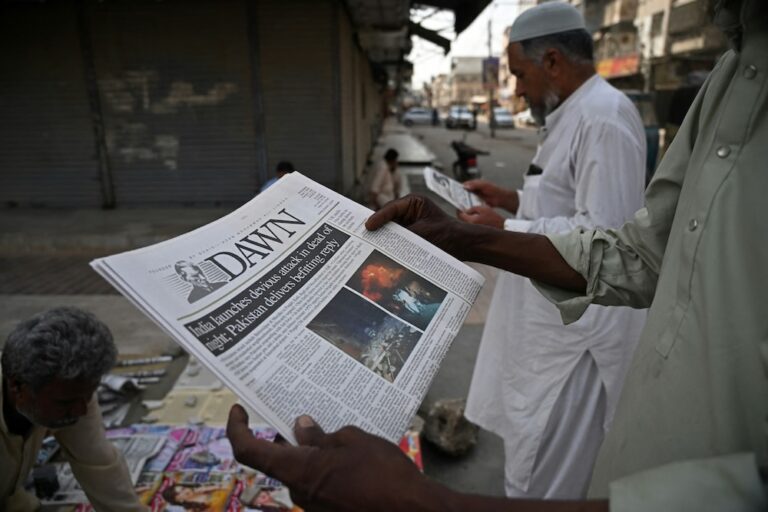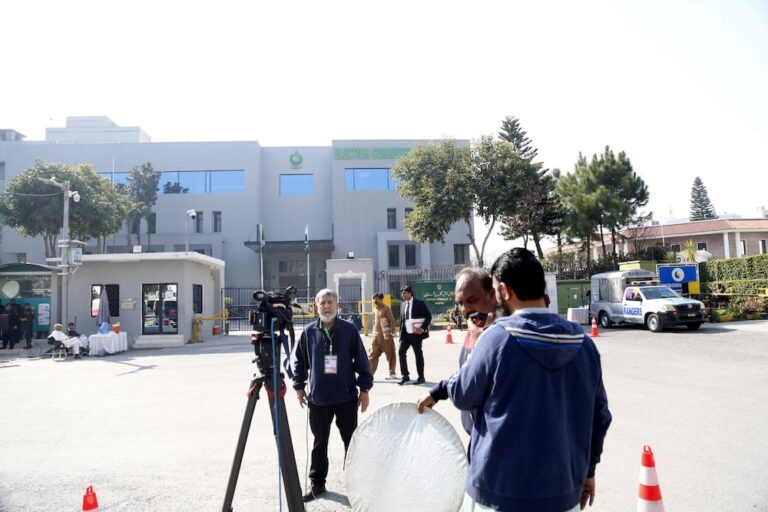Pakistan Press Foundation urged authorities to allow journalists to continue their work without intimidation.
This statement was originally published on pakistanpressfoundation.org on 30 January 2024.
Pakistan Press Foundation (PPF) is alarmed by the issuance of notices by the Federal Investigation Agency (FIA) to several dozen journalists and media professionals for being part of an “explicit and malicious campaign against Honorable Judges of [the] Supreme Court of Pakistan.” PPF urges the government to direct the relevant state bodies, including the FIA, to work toward ensuring free expression rather than clamping down on it, as these work as tools to harass and intimidate the media into silence.
Freedom of speech and expression is a fundamental right guaranteed by Article 19 of the Constitution. Journalists must be free to report on and analyze key developments in the country, including court proceedings, without being accused of partaking in “malicious campaigns.”
As the Chief Justice of Pakistan, Qazi Faez Isa has taken suo-motu notice of the incident and is hearing the case, PPF is hopeful that the court will direct the relevant authorities to ensure that the media is not subject to such punitive measures and can work without the fear of repercussions.
On January 17, a joint investigation team was formed to investigate a smear campaign against judges. According to Dawn, reports were shared on social media that the FIA Cybercrime Wing issued notices to approximately 47 journalists after noticing a “smear campaign against judges.”
One of the recipients of the notices, journalist Asad Ali Toor, uploaded a copy on X, formerly Twitter, which included details such as the inquiry number, name of the complainant (Anees Ur Rehman), and the gist of the allegations. The notice directed Toor to appear before and record his version at the FIA Cybercrime Reporting Centre.
Meanwhile, Caretaker Information Minister Murtaza Solangi on January 28 said that 110 notices had been sent of which the suspects included 32 journalists, Geo reported.
The minister was quoted saying: “Issuing notices to someone does not mean to harass someone or declare someone a criminal. If there is an arrest, FIR, house raid, abduction, or chase, then it can be called harassment.”
It is worthwhile to remind the information minister that notices are a measure that have a similar effect as that of case registrations and proceedings against media professionals by intimidating them with the fear of legal proceedings and also sending a message to other journalists of the repercussions of certain coverage, reporting or analysis.
Additionally, Solangi added that it was important to state that freedom of expression was not unlimited and had “reasonable restrictions” including that you can’t run a campaign against the armed forces or judiciary that goes beyond the parameters of the Constitution and the law.
“Criticism is protected in the Constitution. We are not talking about criticism here; we are talking about humiliation and character assassination. Whatever has been done against the Supreme Court judges is in no way criticism […],” he said.
Article 19 of the Constitution states: “Every citizen shall have the right to freedom of speech and expression, and there shall be freedom of the press, subject to any reasonable restrictions imposed by law in the interest of the glory of Islam or the integrity, security or defence of Pakistan or any part thereof, friendly relations with foreign States, public order, decency or morality, or in relation to contempt of court, [commission of] or incitement to an offence.”
PPF urges the government to ensure that the media’s rights to report on developments and provide analysis are not restricted through notices by government bodies such as FIA. Instead, they can continue their work without intimidation.
On January 27, the Press Association of the Supreme Court President Aqeel Afzal and Islamabad High Court Journalists Association President Fayaz Mahmood issued a joint statement condemning the notices to working journalists associated with media organizations.
As per the statement, the two associations held a joint meeting with a one-point agenda to review the notices issued by the FIA to journalists. Both agreed that the FIA notices were a source of concern for the journalists’ community even though the Constitution safeguards a right to free expression, and the court has always encouraged productive criticism. The statement added that an independent media was necessary for democracy just as an independent court was.
Condemning the notices, the associations demanded that working journalists not be harassed by such steps and that the notices be taken back. They added that if the harassment by FIA did not stop, their next steps would be decided in consultation with other journalists’ organizations.
According to Dawn, after meeting with representatives of the two associations, CJP Isa, on January 27, took suo-motu notice of the “alleged harassment” of journalists and made a three-member bench to take up the case along with another case from 2021 at the request of the Press Association of the Supreme Court regarding harassment of journalists, Dawn reported.
During the case proceedings on January 29, the three-member bench “emphasized” that journalists should not be booked; however, they did not suspend the proceedings by the FIA, Dawn reported.
As the case resumed on Tuesday (January 30), the apex court gave media professionals time till the general elections to appear before the FIA. The Attorney General of Pakistan, Mansoor Usman Awan, added that the notices against the journalists will be taken up after the elections, Geo reported.



